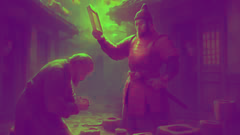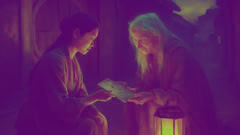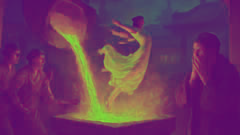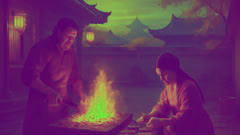Introduction
In the heart of ancient Beijing, when jade-green willows brushed the sparkling waters of the city’s moats and red lanterns glimmered against the backdrop of soaring palace roofs, the city lived in the shadow of imperial grandeur. Dragons curled in gold above temple eaves, and mandarins in their silk robes scurried through the crowded lanes, their faces as guarded as the secrets inside the Forbidden City. Here, in a winding street humming with the clang of hammers and the hiss of molten metal, the bellmaker Kouan-Yu toiled beneath the weight of the Emperor’s command. To outsiders, he was but a craftsman—albeit one whose skill was whispered about from the Pearl River to the Mongol steppes. But within his modest courtyard, shaded by ancient ginkgo trees, he was a father, and his world revolved around his only child, Ko-ai, whose name meant "Little Love." She was known for her laughter that chimed like a silver bell and the kindness that rippled outward, softening even the most calloused hearts in the city. Yet beneath the joy, both father and daughter felt the looming presence of the imperial edict: to cast a bell so perfect, so resonant, it would echo through the heavens and win the Emperor’s favor for all eternity. It was not just a command—it was an ultimatum. If the bell failed, Kouan-Yu’s family and name would be wiped from memory, their honor smelted to ash. The Emperor’s demand would test the limits of human devotion, artistry, and courage, and set Ko-ai on a path that would forever entwine her spirit with the city’s soul. On nights when the wind howled over the city walls and the moon glowed like polished ivory, the bellmaker’s forge roared bright—while within the house, Ko-ai listened to her father’s footsteps and the deep sighs that spoke of unspoken fears. In this crucible of hope and dread, a legend was born—one that still lingers in the hush before dawn, when the soundless bell tolls in the heart of Beijing.
The Emperor’s Edict and the Bellmaker’s Dilemma
When the first imperial messenger arrived at Kouan-Yu’s humble workshop, his arrival brought not only the crimson banner of the Emperor but also a hush that seemed to settle over the entire city. Onlookers pressed themselves against wooden doors as the messenger unrolled a scroll edged in gold and spoke in a voice that carried the weight of law: “By the order of the Son of Heaven, a bell shall be cast—a bell so magnificent that its voice will ring from the Temple of Heaven to the distant seas. Should it fail to please His Majesty, those responsible will answer with their honor and their lives.”

Kouan-Yu bowed low, sweat prickling his brow. He’d crafted bells for temples and palaces, for weddings and funerals, but nothing of this scale or consequence. When he finally dared to meet the messenger’s gaze, he saw no sympathy there—only the cold reflection of duty. Ko-ai, hidden behind a half-closed screen, pressed her fingers to her lips, her heart thundering.
That night, Kouan-Yu sat with Ko-ai in their courtyard as moonlight dappled the stones. He tried to smile, but she saw the tremor in his hands. "Little Love," he whispered, "the Emperor’s wish is as heavy as the mountain."
Ko-ai reached for his hand. "We will carry it together, Father. You taught me to listen to the metal—its music, its moods. This bell will not defeat us."
The following days were a flurry of preparation. Kouan-Yu gathered the finest copper, tin, and gold, each weighed with exacting care. Artisans from distant provinces came to aid him, their voices rising in a polyphony of dialects. A great pit was dug in the shadow of the city wall, and scaffolding rose like a forest of bamboo. The entire neighborhood watched as wagons rolled by with slabs of ore and casks of oil, wondering if this bell might someday save them—or doom them all.
Ko-ai became the soul of the workshop. She soothed tempers, tended the wounded, and brought rice and tea to exhausted workers. But even as the days lengthened and the mold took shape, her father’s anxiety grew. The formula for the perfect bell was elusive; each alloy, each ratio, carried its own risks. Kouan-Yu pored over ancient scrolls by candlelight, seeking the secret to a flawless resonance.
At last, the day for the first casting arrived. The pit blazed with heat as molten metal cascaded into the mold. Kouan-Yu’s heart beat in his throat as he watched the surface shimmer gold and silver, praying to the ancestors for guidance. Hours passed before the mold cooled. When at last it was opened, a gasp rippled through the crowd: the bell was beautiful, but when struck, it gave off a dull, lifeless sound.
A whisper started among the workers—the blend was wrong. Some claimed the copper was impure; others blamed the night’s humidity or a curse. Kouan-Yu collapsed in despair. “The Emperor will not forgive this,” he murmured. Ko-ai knelt beside him, her eyes shining with resolve. "We cannot give up, Father. There is always another way."
The Emperor, upon hearing of the failure, sent a new edict: “You have one more chance. If you fail again, there will be no mercy.” The city held its breath. Kouan-Yu’s sleep grew feverish and haunted. Ko-ai watched him with growing worry. She spent her nights praying beneath the ginkgo tree, vowing to find a solution—even as rumors of sorcery and ancient sacrifices drifted on the wind.
The Mysterious Alchemist and Ko-ai’s Destiny
As the city whispered about the bell’s failure, Ko-ai found herself haunted by dreams. Night after night, she wandered through endless corridors of black stone, following a sound that was both music and grief. One evening, as she returned from the market with rice and lotus roots, she met an old woman sitting at the threshold of their gate. The woman’s hair was white as frost, her robe faded and patched, but her eyes sparkled with a curious light.

"Child," she croaked, "the heart of metal is stubborn. To change its nature, one must give more than skill—one must give spirit."
Ko-ai knelt beside her. "We have tried everything. My father’s heart is breaking. Is there truly no remedy?"
The old woman drew from her sleeve a slip of silk, inscribed with an ancient formula: copper, tin, gold—and something else, a symbol Ko-ai did not recognize. "In distant ages," said the woman, "it was believed that to awaken the true voice of metal, a living soul must be offered to the flames."
Ko-ai recoiled. “Surely there is another way.”
The woman’s gaze softened. “Every great thing comes at a cost. But love, when given freely, is the most powerful offering of all.”
As suddenly as she had appeared, the old woman vanished into the dusk. Ko-ai clutched the silk, her mind torn between dread and hope.
That night, she shared none of this with her father, but instead watched him as he pored over formulas, his hands trembling. She saw how age had crept into his face, how his spirit dimmed with each failure. As she drifted to sleep, she remembered her mother’s words: “Our family’s strength is not in metal or fire—it is in our hearts.”
Preparations for the second casting began. This time, Kouan-Yu and his team worked with even greater care. Ko-ai moved quietly among them, memorizing every step, every ingredient. When the night before the casting arrived, she slipped into the workshop alone and laid the slip of silk beside her father’s tools.
Kouan-Yu found it at dawn. He stared at the unknown symbol, its meaning like a shadow at the edge of his mind. “A living soul…,” he murmured, but dismissed it as superstition. The work must go on.
When the second casting began, the city seemed to pause. The sky was low and gray; a hush settled over the workers. The molten metal glowed brighter than before as it poured into the mold. Hours passed in anxious silence. When at last the bell was freed, it gleamed like a pearl—but once more, when struck, its song was flat and lifeless.
Kouan-Yu fell to his knees. “I am undone,” he whispered. Tears streamed down his face as workers drifted away in fear and sorrow. Ko-ai knelt beside him, her own heart breaking. She remembered the old woman’s words and understood what must be done.
That night, as Kouan-Yu slept in exhaustion, Ko-ai wrote a letter to her father and slipped it beneath his pillow. She left quietly, dressed in white silk, her hair unbound. The moon was full as she walked to the casting pit where the third and final attempt would soon take place. She gazed at the scaffolding, at the yawning mouth of the furnace, and knew that her love could save her father—and the city’s hope.
The Sacrifice and the Song of the Great Bell
Morning dawned cold and pale on the day of the final casting. Kouan-Yu awoke to find Ko-ai missing and a letter folded beneath his pillow. With trembling hands he read her words: “Dearest Father, forgive me for leaving you. I have found a way to save your name and our honor. My love for you is greater than my fear. Trust me, and remember me when the bell sings.”

Panic rose within him as he rushed to the workshop, shouting her name. Workers stared in confusion; the foreman shook his head. But there was no time to search—the Emperor’s officers had arrived to oversee the casting. The city’s future hung in the balance.
As preparations began, Kouan-Yu worked in a daze, haunted by his daughter’s letter. The furnace roared with heat; metal shimmered, angry and wild. Unbeknownst to all but Ko-ai, she hid behind the wooden scaffold, eyes shining with love and resolve.
As the molten metal was poured into the mold—a torrent of silver and gold—Ko-ai stepped forward. In a single, graceful motion, she leapt into the fiery stream, her white silk trailing like a comet. A gasp rose from those who caught a glimpse before the flames consumed her form. The metal hissed and seethed, but settled with an eerie calm.
Kouan-Yu, sensing something had shifted, collapsed in grief as realization dawned. He wept until his voice was hoarse, his tears lost in the steam that rose from the cooling bell. The city mourned with him; word of Ko-ai’s sacrifice swept through alleys and palaces alike.
When at last the mold was broken and the bell revealed, it shone with a strange radiance—its surface rippled like water and glinted with hidden colors. On the day of testing, the Emperor arrived in state, his retinue filling the square before the Temple of Heaven. All Beijing waited as Kouan-Yu raised the mallet and struck the bell.
The sound that rang out was unlike any heard before: deep and sonorous, trembling with sorrow and beauty, echoing across the city and up into the sky. Some claimed they heard a girl’s voice within its song—a cry of love and longing that brought tears to even the hardest hearts. The Emperor was moved to silence; his ministers bowed their heads in awe.
The bell was hoisted to its final resting place, where it would ring for centuries. Kouan-Yu never recovered from his grief, but he took comfort in knowing his daughter’s spirit lived on in the bell’s voice. The people of Beijing told her story for generations—of a daughter’s courage, a father’s love, and a bell whose song could never be silenced.
Conclusion
Long after the Emperor and his court had faded into history, the Great Bell of Beijing remained—a monument to courage and devotion. Its voice echoed not just through palaces and temples, but through every street and household that remembered the sacrifice of Ko-ai. For centuries, people believed that on quiet nights, if you listened closely to the bell’s toll, you could hear her gentle voice singing with love and longing. The legend endured because it spoke to something timeless: that true greatness is not measured in gold or power, but in acts of selfless devotion. Ko-ai’s sacrifice transformed tragedy into beauty and ensured her spirit would forever be part of Beijing’s soul. The Great Bell became more than metal—it became a vessel for memory and hope, a reminder that even in the darkest hours, love can shape destiny and echo through generations.













